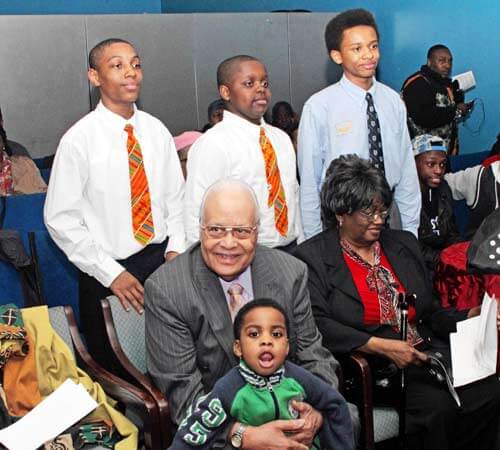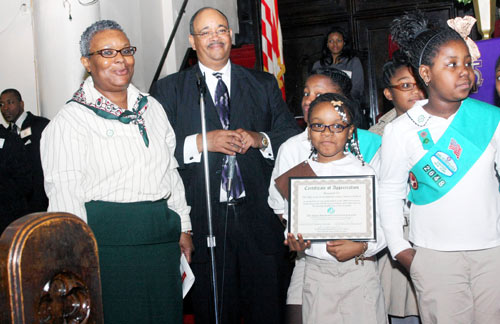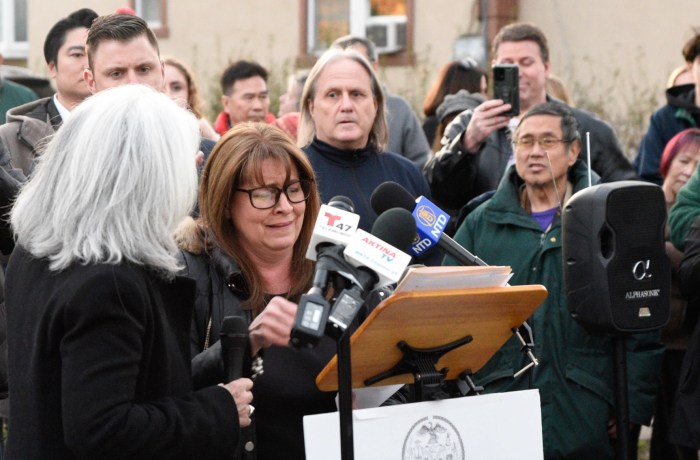Historical events that detail the Black experience are best understood when the teller is giving a first person account. Claudette Colvin , who at 15 years of age found the courage and strength to stand up to Alabama’s segregation Bus laws, was forefront at the United African Movement Forum at 1061 Atlantic Ave., Brooklyn on Wednesday, April 2, to describe to a packed house of students and adults, her experience and treatment on that historic day of March 2, 1955.
Ms. Colvin ‘s gait is now slower and the scars of her life’s battle are etched on her brow, but her spirit remains feisty as she vividly recalls every minute detail of what transpired 59 years ago. She said, “I was in a group of about 13 students who had walked downtown to take the bus. The students sat in their seats and as more whites got on, a young white woman was standing near me. Three students got up and moved to the rear. I was sitting opposite a white woman, but whites are to sit in front of Colored people. I remained seated. I could not move because history had me glued to my seat. Fresh in my mind were the different Black leaders whom I had just studied for Negro History Week. I had learned about Frederick Douglas, W.E. Dubois, and George Washington Carver and talked about breaking barriers.”
Claudette Colvin recalled the many local discrimination issues, like not being able to try on shoes in local department stores if whites patronized the stores. Emotionally, she had reached the breaking point. She said she felt as though Sojourner Truth and Harriet Tubman both had their hand on each shoulder keeping her down in that seat, and “once you have that conviction that you will not let a white bus drivers harass you, then it was time not to be on the auction block.” So when told that she had to get up and give her seat to a white passenger because it was the law, she decided that she could no longer obey such unjust laws. Her resistance led to her being arrested, manhandled and taken to an adult jail with an empty cot and a peep hole. “When the keys went ‘click,’ I started to repeat the 23 Psalms and Edgar Allen Poe poems,” she reminisced.
Ms. Colvin was placed on indefinite probation by the Juvenile Court for violation of the city’s segregation law. This groundbreaking incident took place nine months before the celebrated Rosa Parks took a similar stand and refused to move to the rear of the bus. Ms. Colvin’s incident spearheaded the Browder v Gayle case which involved three other plaintiffs. The outcome of this case was the ruling that Montgomery’s segregated bus system was unconstitutional. Two years later, Ms. Colvin moved to New York and worked as a nurse’s aid at a nursing home in Manhattan until she retired in 2004. Ms. Colvin is the mother of two sons, (her first born was conceived around the time of the bus incident); five grandchildren and three great grand children. This true civil rights heroine has remained in the shadow of Rosa Parks and expresses neither envy nor remorse.
It was important for the students in attendance to interact with Ms. Colvin. Present and past students from Sankofa International Academy helped to highlight the program. Malik Gibson gave a riveting presentation on Ms. Colvin and was later joined on stage by Kalif Green, Gene Johnson Jr. and Aliah Lovell to pledge tributes to the Elders. Reverend Herbert C. Oliver, a native of Alabama who was also involved in the civil rights struggle and stood up to Bull Connor, Birmingham Commissioner of Public Safety, helped the students to fully gage the impact of the history makers which whom they mingled. Relatives of Claudette Colvin, including cousin Anne Pearl Edwards who walked for 381 days during the boycott, were bursting with historical anecdotal much of which historians and text books continue to omit.




















